Is Lupin Flour Vegan?
Understanding Its Plant-Based Origins
Lupin flour, a product derived from the legume seeds of the Lupinus genus, is rising in popularity as a flour substitute in many dietary circles. It stands out as a plant-based protein powerhouse with a rich fiber content, making it a compelling ingredient for vegan recipes. As a vegan-friendly flour, it contains no animal products or by-products, adhering strictly to the principles of vegan diets which exclude all forms of animal exploitation and cruelty for food or any other purpose.
The flour's nutritional profile is impressive, offering a significantly higher amount of protein and fiber compared to many grain-based flours, while maintaining minimal fat and digestible carbohydrate levels. These attributes are particularly beneficial for individuals following a vegan diet, as they often seek alternative sources of protein and fiber that would be traditionally obtained from animal-based products. Moreover, lupin flour's low carbohydrate content makes it a favored choice for those on vegan ketogenic diets looking to reduce their intake of net carbs.
Nutritional Profile of Lupin Flour
Lupin flour stands out for its exceptional nutritional content, offering a high protein and fiber count while maintaining low levels of fat and carbohydrates. It serves as a nutrient-dense option suitable for various dietary preferences.
Protein Content
Lupin flour is remarkably high in protein, with studies showing that it contains approximately 40 grams of protein per 100 grams of flour. This makes it a substantial source of protein, particularly for people following vegetarian or vegan diets where protein sources are a point of focus.
Carbs and Fiber
The carbohydrate content in lupin flour is intriguingly low, especially when considering its high dietary fiber. It has about 1 gram of net carbs per quarter cup due to the high fiber content offsetting the total carbs. Dietary fiber amounts to a notable 37 grams per 100 grams of flour, which aids in digestive health and can be beneficial for blood sugar management.
Vitamins and Minerals
Lupin flour, being derived from a legume, is not only rich in macronutrients but also contains essential micronutrients. It provides a good source of potassium, folate, calcium, and iron, which play vital roles in various bodily functions, including maintaining healthy nerves, muscle function, bone health, and oxygen transport. The specific quantities of these minerals may vary depending on the brand and the soil in which the lupin plant was grown.
Lupin Flour in Vegan Diets
Lupin flour emerges as a commendable choice for those adhering to a vegan diet, offering an ideal blend of high protein and low carbohydrate content. It not only enriches vegan baking with its versatility but also finds its way into a myriad of common vegan recipes, from comfort foods to culinary innovations.
Vegan Baking with Lupin Flour
Vegan baking can often be a challenge due to the absence of ingredients like eggs and dairy. Lupin flour serves as an excellent gluten-free and keto-friendly substitute in baking, creating textures and flavors that please the palate without compromising dietary principles. It's instrumental in making gluten-free cakes, waffles, and pancakes, providing a spongy, light consistency that mimics traditional wheat flour. Moreover, lupin flour's binding properties make it an ideal ingredient in pizza (What wine goes well with pizza?) crusts and cookies, resulting in a pleasant chewiness. For those with a penchant for sweetness, lupin flour enables the creation of delectable brownies that are both moist and rich.
Common Vegan Recipes Using Lupin Flour
Beyond baked goods, lupin flour has proven to be a versatile componentin various other vegan recipes. Given its high protein content, it satisfies the nutritional demands of a vegan diet and serves as an excellent meat substitute. Lupin flour is often incorporated into vegan burgers, where it improves the patty's texture while bolstering its protein quota. This flour is also a common thickening agent for sauces and soups, introducing body and depth absent of any animal products. Due to its low carbohydrate levels, it fits seamlessly into a vegan keto diet, broadening the scope of acceptable culinary creations while maintaining ketosis.
Lupin Flour and Allergies
Lupin flour is a vegan-friendly flour alternative made from the legume lupini beans. While it is praised for its high protein and fiber content, individuals with certain allergies should proceed with caution.
Peanut and Legume Allergies
Lupini beans, the source of lupin flour, belong to the legume family and are closely related to peanuts and soybeans. This connection is critical for individuals with peanut or legume allergies. Due to the cross-reactivity among legumes, people who are allergic to peanuts might also react to lupini beans. Here's a brief overview:
Allergen Association: Legumes like peanuts, soybeans, and lupini beans have similar protein structures.
Allergic Reactions: Reactions can include itchy skin, hives, swelling, gastrointestinal discomfort, respiratory issues, or anaphylaxis.
Caution and Label Checking: Those with peanut or legume allergies should thoroughly check product labels and consult with a healthcare professional before incorporating lupin flour into their diets. Manufacturers sometimes process lupin flour in facilities that handle other nuts and legumes, leading to possible cross-contamination.
It's important to note that while not everyone with a peanut allergy will be allergic to lupin flour, the potential for an allergic reaction does exist and should be taken seriously.
Lupin Flour as a Gluten-Free Alternative
Lupin flour emerges as a high-protein, low-carbohydrate alternative to traditional wheat flour, making it a valuable option for those adhering to a gluten-free diet. It distinguishes itself in nutritional content and baking adaptability, catering to a variety of dietary needs.
Comparing with Other Gluten-Free Flours
When comparing lupin flour to other gluten-free flours, one observes distinct differences in nutritional profiles and baking properties. For instance:
Almond Flour: While almond flour is a common gluten-free option rich in vitamins and minerals, lupin flour surpasses it with a substantially higher protein content, estimated at 40 grams per 100 grams, and lower fat content. Almond flour works well in recipes that require a moist texture, such as cakes and cookies.
Coconut Flour: Another gluten-free staple, coconut flour, is highly absorbent and requires a greater amount of liquid in recipes. It is lower in protein but high in fiber. Lupin flour, on the other hand, boasts a balanced nutrient composition, making it conducive for bread and other baked goods that require a wheat-like texture.
Chickpea and Pea Flours: Both are grain-free options, like lupin flour, and offer a good amount of protein and fiber. However, they can impart distinct flavors to dishes that may not always be desired. Lupin flour, while having a slight bitterness, is more neutral in taste and closer to all-purpose flour in texture, lending itself to a wider range of baking applications without altering the flavor profile significantly.
All-Purpose Flour: Although not gluten-free, it's useful to note that lupin flour serves as an alternative to this wheat-based staple with the added benefits of being higher in dietary fiber and protein, and lower in carbohydrates, making it suitable for those on gluten-free, keto, or low-carb diets. It provides a similar consistency and heat resistance, crucial for baked goods like bread that require structure and rise.
In each case, lupin flour stands out as a versatile gluten-free alternative capable of delivering nutritional benefits and textural properties conducive for baking diverse gluten-free products.
Lupin Flour in Low-Carb and Keto Diets
Lupin flour is increasingly recognized as a suitable flour alternative for those adhering to keto and other low-carb diets due to its macronutrient composition, which aligns well with the dietary restrictions of these regimens.
Carbohydrate Content and Keto Recipes
Lupin flour has a low carbohydrate content, making it highly compatible with a ketogenic lifestyle. Specifically, lupin flour comprises a total of 12 grams of carbs per 30-gram serving, but because 11 grams are fiber, the net carb content is just 1 gram. This high fiber and low net carb profile facilitates the maintenance of the ketosis state which is central to a successful keto diet.
The flour's high protein content also supports the protein requirements of a low-carb diet without the additional carbs that other flours typically contribute. Owing to its gluten-free nature, lupin flour is a healthy alternative for individuals with gluten sensitivities or celiac disease, yet who also wish to follow a low-carbohydrate lifestyle.
Keto-friendly recipes that utilize lupin flour are diverse, ranging from homemade noodles that only require eggs, cream cheese, and lupin flour, to low-carb bread, pizza crusts, and pancakes. The versatility of lupin flour in low-carb cooking is enhanced by its mild taste, which pairs well with a variety of flavors and ingredients.
Culinary Applications of Lupin Flour
Lupin flour's low carbohydrate content and high protein make it a favorable ingredient for those adhering to keto diets. It lends itself to a variety of baking recipes, including but not limited to bread, cookies, and cakes.
Baking and Cooking Adjustments
Bakers often turn to lupin flour when making low-carb or grain-free baked goods like bread, brownies, cookies, and pancakes. It is crucial to note that lupin flour does not behave identically to wheat flour due to the absence of gluten, which influences the structure and elasticity in traditional baking. Recipes may require additional binding agents, such as eggs or xanthan gum, to compensate for this lack of gluten. Accurate measurements are essential, and using a kitchen scale can yield more consistent results.
Bread and Pizza Crusts: To achieve a desirable rise, recipes often combine lupin flour with yeast or baking powder.
Sweet Bakes (cakes, brownies, cookies): A reduced amount of sweeteners may be necessary as lupin flour has a naturally sweet taste compared to other flours.
Pancakes and Waffles: Mixing lupin flour with other ingredients may require some trial and error to perfect the desired fluffiness and thickness.
Flavor and Texture Considerations
Lupin flour imparts a slightly nutty and earthy flavor to dishes, which can complement both sweet and savory preparations. Since it's derived from a legume, the texture of lupin flour can differ from that of grain-based flours. The baked goods tend to be denser and heavier, so incorporating air through proper mixing and sifting can help lighten the texture. For those new to lupin flour, they may want to start by substituting a portion of traditional flour to gradually get accustomed to its unique taste and textural properties.
Savory Dishes: Lupin flour can enhance the flavor profile of keto-friendly pizza crusts or be used for breading in frying, with seasonings adjusted to balance its natural taste.
Sweet Treats: When used in cookies and cakes, the flour's inherent sweetness can reduce the need for added sugar or sweeteners.
Environmental and Agricultural Aspects of Lupins
Lupinus spp., commonly known as lupins, are legumes recognized for their role in sustainable agriculture and for their ability to be ground into nutrient-rich flour. Not only are these plants beneficial for the soil, but their beans are also an organic option for various food products.
Cultivation of Sweet Lupin Beans
The cultivation of lupin, particularly sweet lupin beans, necessitates specific soil and climatic conditions. They thrive in well-drained soils with a slightly acidic to neutral pH. As a hardy legume, the lupin plant can fix nitrogen in the soil, which promotes healthier crop rotation and less reliance on chemical fertilizers. Sweet lupin cultivation is predominant in the Mediterranean region but has seen growth in both the Americas and Africa due to their adaptability and low maintenance agricultural requirements.
Major growing conditions for sweet lupins:
Soil Type: Well-drained
Soil pH: Slightly acidic to neutral
Climate: Mediterranean preferred; adaptable to various regions
Lupin in Sustainable Agriculture
Lupins play a significant role in sustainable agriculture, serving as a green manure crop to enhance soil fertility. The nitrogen-fixing capabilities of lupins can enrich agricultural land, reducing the need for synthetic fertilizers and promoting organic farming practices. Sweet lupin beans, when ground into flour, offer a high-protein alternative to wheat flour, catering to the increasing demand for plant-based proteins. Their contribution extends beyond nutrition to environmental health, solidifying lupins' position in sustainable agricultural systems.
Health Benefits and Considerations
Lupin flour is a high-fiber, high-protein, and low-calorie ingredient that offers a number of health benefits, especially in the context of vegan diets. In the realm of nutrition, it stands out due to its ability to aid in weight management and support cardiovascular health.
Weight Management and Cardiovascular Health
Lupin flour can be an effective ingredient for weight management due to its low calorie content and high dietary fiber. A quarter cup serving has approximately 74 calories, a minimal 1 gram of net carbs, and a substantial 11 grams of fiber. Dietary fiber is key in promoting a feeling of fullness, which can help reduce overall calorie intake and support weight loss efforts.
The same fiber content that aids in weight management also contributes to cardiovascular health by supporting lower blood pressure levels. Additionally, the low carbohydrate profile of lupin flour can contribute to better blood sugar regulation, which is a factor in maintaining heart health. The ingredient's high protein content, with about 12 grams per serving, is vital for those on vegan diets, as it provides an essential macronutrient often more challenging to obtain through plant-based sources alone.
Individuals incorporating lupin flour into their diets may experience nutritional benefits that align with a healthy and balanced vegan lifestyle. However, as with any ingredient, it should be consumed in moderation within the context of a varied diet.







